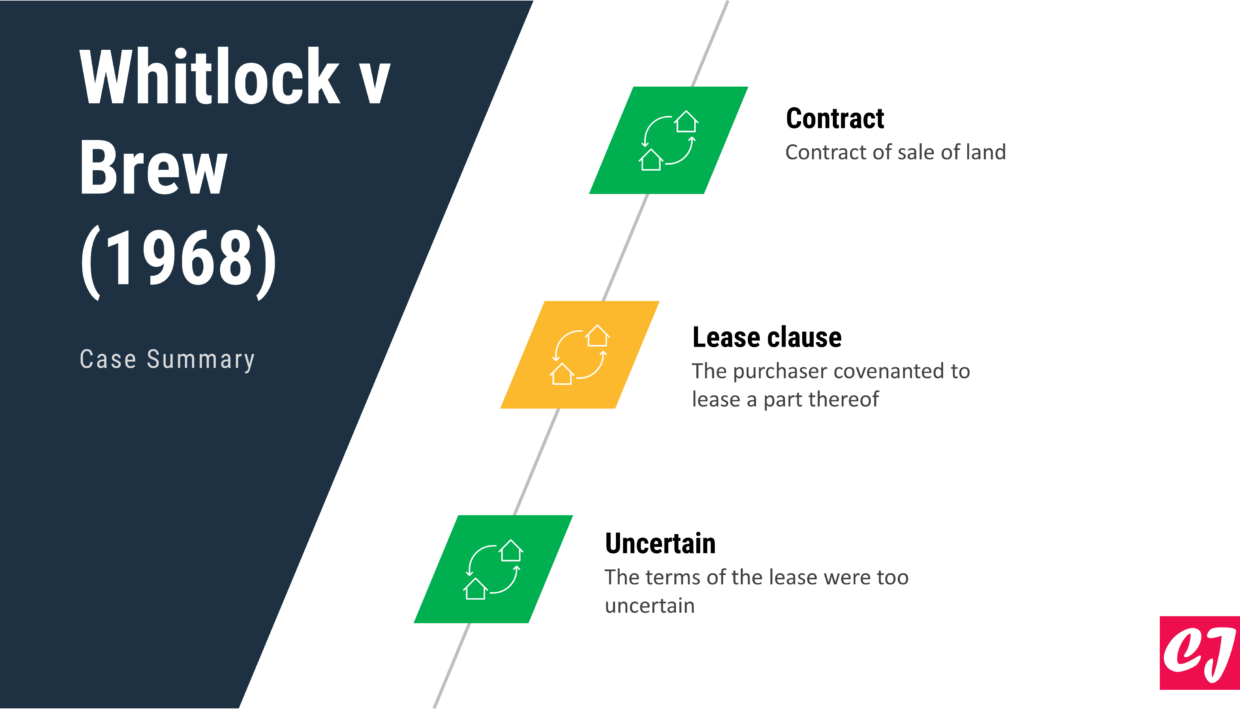
A Summary of Whitlock v Brew (1968) Case
Whitlock v Brew (1968) revolves around the issue of uncertainty and whether a clause of a contract that is uncertain can render the whole contract invalid if it cannot be severed from the contract.
Given below are the case details:
| Case name & citation: | Whitlock v Brew [1968] HCA 71; (1968) 118 CLR 445 |
| The concerned Court: | High Court of Australia |
| Decided on: | 31 October 1968 |
| The bench of judges: | McTiernan, Kitto, Taylor, Menzies and Owen JJ. |
| Area of law: | Contract of sale of land; Uncertainty |
Facts of the case (Whitlock v Brew)
A contract for the sale of land was entered into between two parties. The contract involved a condition that on possession, the purchaser would grant a lease of a part of the land to an oil company (Shell) for the sale of petroleum products. The lease would be on “such reasonable terms as commonly govern such a lease.”
There was another term in the contract which provided that in the event of a dispute regarding the interpretation of this lease clause, the matter would be resolved through arbitration. The arbitrator will be appointed by the President of the Law Institute of Victoria.
Initial judgment
The contract was rescinded by the seller and the deposit was forfeited. The purchaser sued to recover the deposit but failed in the initial judgment. The decision was appealed to the Full Court of the Supreme Court of Victoria. The Full Court allowed the appeal.
They considered the condition void for uncertainty and not severable, making the entire contract unenforceable. They also found that there was no consideration for the deposit, so it could be recovered as money had and received.
The seller appealed to the High Court.
Judgment of the High Court in Whitlock v Brew
The majority of the High Court decided that the lease clause was too uncertain as it did not specify the term of the lease or the rent amount. This uncertainty made it impossible to determine the essential terms of the lease and it being a material and inseverable part of the contract of sale, no concluded contract existed between the parties. The contract was not enforceable.
As regards the arbitration provision, the Court decided that the interpretation and operation of the clause was such that it did not authorize an arbitrator to fix the lease’s term or rental amount.
There was no previous course of dealings between the parties that could be referred to neither was there any established set of standards in common use that could be referred to for fixing the term or rent of the lease. As a result, no underlying contract could be said to have effected and consequently, the arbitration clause was also of no effect.
Furthermore, the arbitration clause only allowed a third party (the arbitrator) to resolve any disputes between the parties regarding the terms commonly used in such leases, it did not empower him to fix the terms of the contract and remove uncertainty.
Conclusion
The High Court of Australia adopted a strict approach in Whitlock v Brew (1968). The contract was deemed too uncertain to enforce because it lacked essential details regarding the term of the lease or rental amount. The lease condition was void for uncertainty and inseverable from the main contract. Hence, there was no enforceable contract and the seller was not entitled to retain the deposit.
List of references:
YOU MIGHT ALSO LIKE:
MORE FROM CONTRACT LAW:

